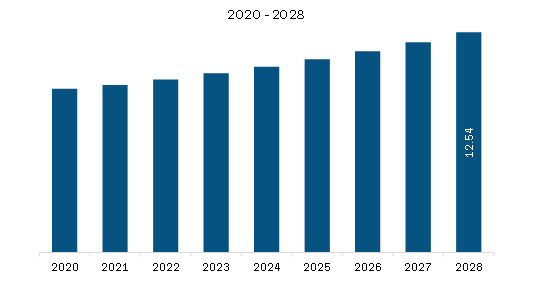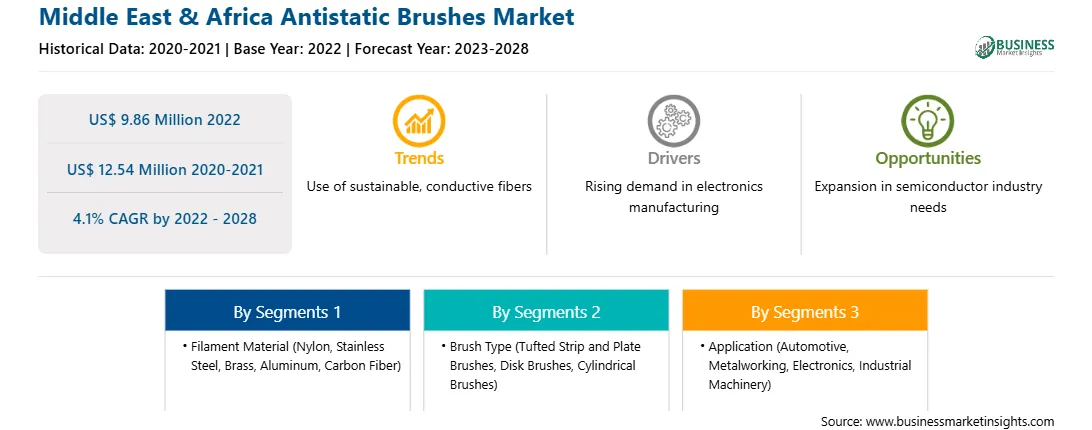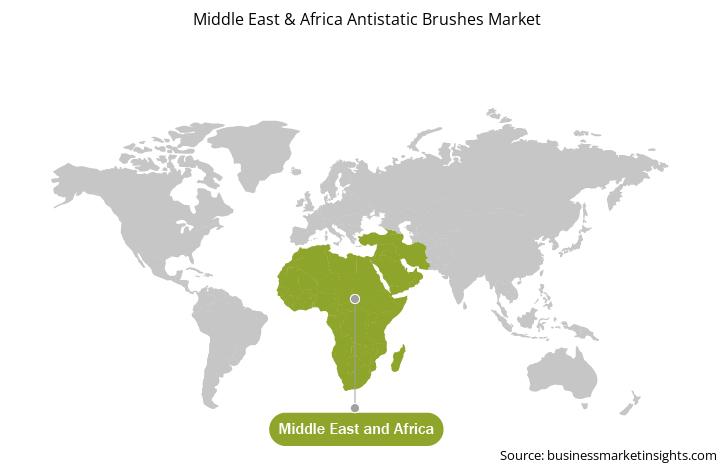According to Viavi Solutions Inc.'s report, over 92 countries across the world have launched 5G networks. A further 23 countries have pre-commercial 5G network trials underway, and 32 nations have announced their 5G rollout plans. The widespread rollout of 5G networks has led to an increased demand for smartphones and other consumer electronics products. With this, the production levels of electronic components—including integrated circuits, transceivers, antennas, and printed circuit boards—have also upsurged. These components are often small, delicate, and sensitive to static electricity. Antistatic brushes are crucial for handling and protecting these components during the manufacturing process, ensuring their reliability and performance.
Antistatic brushes have traditionally been in use in electronics manufacturing, automotive, and printing industries. However, the emergence of new industries is resulting in the expansion of the application scope of antistatic brushes. For instance, the growing field of 3D printing and additive manufacturing can use antistatic brushes to mitigate static charges during printing, thus improving the quality of printed parts. Similarly, developing flexible electronics, wearable devices, and IoT devices opens up new avenues for artistic brush applications.
Further, advancements in nanotechnology, material science, and design processes may benefit the Middle East & Africa antistatic brushes market. Nanostructured materials with superior conductivity and tailored surface properties can be incorporated into brush bristles, enhancing their static-dissipating capabilities. Advanced materials can also offer improved durability, and chemical and wear resistance, making these brushes more reliable and long-lasting. Thus, technological advancements are bringing new significant trends in the Middle East & Africa antistatic brushes market.
The Middle East & Africa antistatic brushes market in the Middle East & Africa is segmented into South Africa, Saudi Arabia, the UAE, and the Rest of Middle East & Africa. Countries in the region seek to attract various smartphone and other electronic product manufacturers. For instance, in September 2022, Egypt's Information Technology Industry Development Agency (ITIDA) and Chinese electronics manufacturer OPPO signed a memorandum of understanding (MoU) to build a mobile phone manufacturing plant in Egypt with ~US$ 20 million in investments. Furthermore, in August 2022, Nokia phone manufacturer HMD Global partnered with Etisal for Advanced Industries (EAI) to assemble 1 million mobile phones in Egypt in 2022, with plans to double production later. In May 2021, PV Hardware opened its new manufacturing facility in Saudi Arabia. The company will manufacture PV structures, solar tracking systems, and robotic cleaning devices in this facility. This growing investment of manufacturers in the region is expected to fuel the demand for antistatic brushes.
Further, the growing automotive sales in South Africa and Saudi Arabia are creating a significant demand for antistatic brushes. For instance, in September 2022, Renault Group Morocco announced that its two factories in Tangier and Casablanca, Morocco, produced 350,000 vehicles in 2022, a 15.3% increase over the production numbers in 2021. The demand for automotive components in the region is anticipated to grow significantly during the forecast period. The Middle East & Africa market is evolving due to the increasing passenger vehicle production. The demand for vehicles made in the region is growing consistently. Rising middle-class income, growing population, and increasing passenger vehicle production are driving the Middle East & Africa antistatic brushes market.
Strategic insights for the Middle East & Africa Antistatic Brushes provides data-driven analysis of the industry landscape, including current trends, key players, and regional nuances. These insights offer actionable recommendations, enabling readers to differentiate themselves from competitors by identifying untapped segments or developing unique value propositions. Leveraging data analytics, these insights help industry players anticipate the market shifts, whether investors, manufacturers, or other stakeholders. A future-oriented perspective is essential, helping stakeholders anticipate market shifts and position themselves for long-term success in this dynamic region. Ultimately, effective strategic insights empower readers to make informed decisions that drive profitability and achieve their business objectives within the market. The geographic scope of the Middle East & Africa Antistatic Brushes refers to the specific areas in which a business operates and competes. Understanding local distinctions, such as diverse consumer preferences (e.g., demand for specific plug types or battery backup durations), varying economic conditions, and regulatory environments, is crucial for tailoring strategies to specific markets. Businesses can expand their reach by identifying underserved areas or adapting their offerings to meet local demands. A clear market focus allows for more effective resource allocation, targeted marketing campaigns, and better positioning against local competitors, ultimately driving growth in those targeted areas.
Middle East & Africa Antistatic Brushes Strategic Insights

Middle East & Africa Antistatic Brushes Report Scope
Report Attribute
Details
Market size in 2022
US$ 9.86 Million
Market Size by 2028
US$ 12.54 Million
CAGR (2022 - 2028) 4.1%
Historical Data
2020-2021
Forecast period
2023-2028
Segments Covered
By Filament Material
By Brush Type
By Application
Regions and Countries Covered
Middle East and Africa
Market leaders and key company profiles
Middle East & Africa Antistatic Brushes Regional Insights

Middle East & Africa Antistatic Brushes Market Segmentation
The Middle East & Africa antistatic brushes market is segmented into filament material, brush type, application, and country.
Based on filament material, the Middle East & Africa antistatic brushes market is segmented into nylon, stainless steel, brass, aluminum, carbon fiber, and others. In 2022, the others segment registered a largest share in the Middle East & Africa antistatic brushes market.
Based on brush type, the Middle East & Africa antistatic brushes market is segmented into tufted strip and plate brushes, disk brushes, cylindrical brushes, and others. In 2022, the tufted strip and plate brushes segment registered a largest share in the Middle East & Africa antistatic brushes market.
Based on application, the Middle East & Africa antistatic brushes market is segmented into automotive, metalworking, electronics, industrial machinery, and others. In 2022, the industrial machinery segment registered a largest share in the Middle East & Africa antistatic brushes market.
Based on country, the Middle East & Africa antistatic brushes market is segmented into South Africa, Saudi Arabia, the UAE, and the Rest of Middle East & Africa. In 2022, Saudi Arabia segment registered a largest share in the Middle East & Africa antistatic brushes market.
Gordon Brush Mfg Co Inc; KIST + ESCHERICH GmbH; KOTI Industrial & Technical Brushes BV; and Ultrafab Inc are the leading companies operating in the Middle East & Africa antistatic brushes market.
The Middle East & Africa Antistatic Brushes Market is valued at US$ 9.86 Million in 2022, it is projected to reach US$ 12.54 Million by 2028.
As per our report Middle East & Africa Antistatic Brushes Market, the market size is valued at US$ 9.86 Million in 2022, projecting it to reach US$ 12.54 Million by 2028. This translates to a CAGR of approximately 4.1% during the forecast period.
The Middle East & Africa Antistatic Brushes Market report typically cover these key segments-
The historic period, base year, and forecast period can vary slightly depending on the specific market research report. However, for the Middle East & Africa Antistatic Brushes Market report:
The Middle East & Africa Antistatic Brushes Market is populated by several key players, each contributing to its growth and innovation. Some of the major players include:
The Middle East & Africa Antistatic Brushes Market report is valuable for diverse stakeholders, including:
Essentially, anyone involved in or considering involvement in the Middle East & Africa Antistatic Brushes Market value chain can benefit from the information contained in a comprehensive market report.